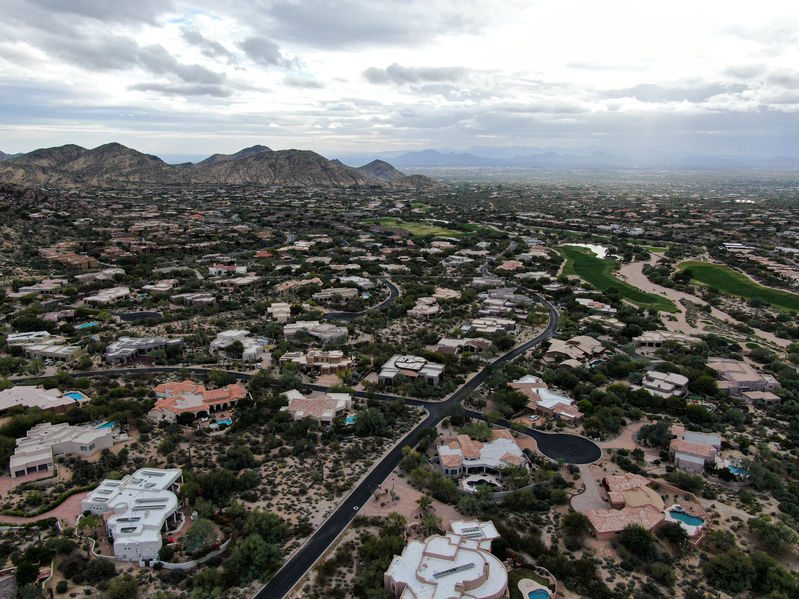Could failure to solve Arizona’s housing shortage puts Arizona’s red-hot economy at risk?
By every metric, the Arizona economy continues to fire on all cylinders, as evidenced by several recent studies and statistics. A recent deep dive into U.S. Bureau of Labor statistics by Skynova ranked our state third in the nation for workforce gain, with a 7.8 percent increase in jobs added between 2017 and last year. Meanwhile, Arizona’s unemployment rate sits at 3.2 percent, a level of employment success not seen for most of the past half-century. And Moody’s “Back to Normal Index,” which tracks how quickly state economies have recovered from the COVID-19 pandemic, puts Arizona’s economy at 99 percent of where the state was in March 2020. That ranks eighth out of the 50 states.
READ ALSO: Is a housing market crash on the way in 2022?

Simply put, nothing fate, circumstance and a public health crisis have thrown at the state has slowed down the pace of Arizona’s economic growth. Which isn’t to say that nothing can stop our turbo-charged economy.
The Arizona housing supply crisis absolutely has the potential to derail the state’s economic development efforts – and hurt tens of thousands of businesses large and small – if we don’t take meaningful action to address the shortage of housing immediately.
As you read this, another 300 people are moving into the Valley today alone. That pace of incoming residents represents more than 100,000 new Arizonans a year at a time when few homes are for sale and rental occupancy stands at a record 98 percent. According to the Arizona Department of Housing, our state must build 270,000 new rental units over the next few years to keep up with this surging demand. Given widespread supply chain issues and the rising cost of raw materials, construction and property taxes, such construction will be a daunting task – and one that will be impossible if cities, towns and their elected leaders keep saying “no” to new housing.
Unfortunately, too many local mayors and council members seem more interested in scoring points with residents shouting “Not In My Back Yard!” than in passing workable solutions for Arizona’s housing shortfall. Arizona’s lack of housing can only be solved if we see with clear eyes the barriers that stand in the way of growing our housing supply and we respond by taking bold action to remove them. Every stymied new development and every new home not built represents a missed opportunity – and a catalyst for rents to surge higher.
Those of us working to solve the issue of rising rents and relief for longtime residents being priced out of their hometowns by recognizing the law of supply and demand and how it impacts the cost of housing need more allies.
During the legislative session, Reps. Steve Kaiser, a Republican, and César Chávez, a Democrat, co-sponsored HB 2674, which sought to address the housing crisis by creating zoning allowances for new developments. Opposed by cities and towns, the bill was revised to create an 11-member Housing Supply Study Committee, tasked with examining the causes driving the state’s housing shortage.
Let’s hope that members of the committee advance meaningful solutions here, because the need to build more housing is an issue that enjoys the support of both parties not simply in Arizona, but nationwide.
In Congress, for example, the Yes In My Backyard Act, which would cut municipal regulations that stifle building projects, enjoys bipartisan favor. President Biden – with whom the Arizona Chamber rarely sides – nailed it in April when he said, “Exclusionary land use and zoning policies constrain land use, artificially inflate prices, perpetuate historical patterns of segregation, keep workers in lower productivity regions, and limit economic growth.”
Arizona needs more housing at every price point in every region of the state. To make that possible, and to keep the Arizona economy’s momentum, we need construction approvals, and we need them now.
Saying “no” to new housing is the economic equivalent of cutting off your nose to spite your face. It’s also saying no to new companies, new jobs, new tax revenues and the core government responsibilities dependent on those revenues – everything from better schools to public safety, social services to better roads and stronger communities. Every last “no” echoes across the economy, much to our state’s detriment.
Danny Seiden is president and CEO of the Arizona Chamber of Commerce & Industry.




